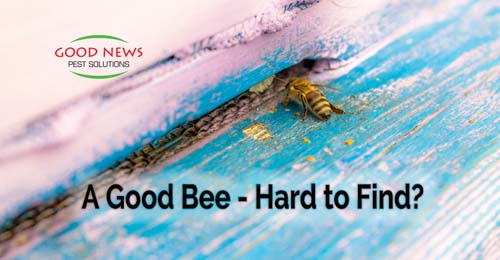
A Good Bee - Hard to Find?
A lot of times, when we think of bees, we picture honey bees and maybe, occasionally, bumblebees. But did you know that scientists over the decades have recorded some 20,000 different bee species? That’s a lot of variation in God’s creation. There are even bees that pollinate exclusively in the Amazon Rain Forests.
Unfortunately, we haven’t always treated bees with the respect they deserve. We’re improving now, but for decades we would clear out their natural habitat to plant huge agricultural fields - fields that, ironically, depended on the bees to pollinate and help grow. Scientists say that 85% of all cultivated crops rely on bees for their growth and survival.
Interestingly enough, recent research into the Amazonian bee hives found that they yielded huge profits from selling the honey and pollen. A lot of money. And considering the low overhead, considerably higher profits than what could be earned by the usual process of clearing of the land for cattle or crops.
For years, we’ve heard reports in the news media about the decline of honey bees. M. Night Shyamalan even used it as a subplot in a weird movie he did a few years back. But a recently published study from Consejo Nacional de Investigaciones Científicas y Técnicas in Argentina shows an even more drastic issue.
On the Bee-cline
According to the scientists at their National Council for Scientific and Technical Research, a startling 25% of the species of bees recorded from 1946 to 2015 have fallen off the map in the last thirty years. They are quick to point out that their results don’t mean these bees have completely died off. Rather, they may now be so rare that no scientist has observed them in nature during these periods.
Essentially, the rarer the bee, the less likely it is to be spotted, despite exponentially more reporting these days. Some 5000 species of bees have become locally extinct or just much scarcer globally. In addition to agriculture, international bee trading may also be connected to disease spreading in hives. And while we’ve scaled back now, the scientists point to the increased use of agrochemicals in the 90’s as a significant factor.
While it’s not a bee-pocalypse yet, we are definitely seeing a decrease of wild bees worldwide, and we shouldn’t take the research lightly. Even outside of our cultivated crops, bees play a vital role in our ecosystems and need to be protected. The time to act is now, before the issue becomes even more of a wide-reaching and potentially catastrophic problem.
For more than 30 years, we at Good News Pest Solutions have strived to protect and steward the environment. We use only the greenest, most natural products and services. Safe for you, your family, your pets, and, yes, the bees. We even care for other pollinators. Instead of killing off mosquitoes, our Mosquito Protection Program turns the biters into vegans. No more bites, but a better world to share. If you’d like more information on that or any of our treatments, just give us a call!
« Back to BlogProudly Serving
Sun City Center, Ruskin, Palmetto, Parrish, Ellenton, Bradenton, Anna Maria, Holmes Beach, Bradenton Beach, Longboat Key, Lakewood Ranch, University Park, Myakka City, Sarasota, Siesta Key, Osprey, Nokomis, Casey Key, Venice, Englewood, North Port, Port Charlotte, Punta Gorda, Arcadia
Things You Can Do
Pay Your Bill Online
Leave Us a Review
Request a Free* Termite Inspection
Stop Mosquito Bites
Get Rid of Rodents
Get a Termite Damage Warranty
Get Pest Control for Your Attic
Get Pest Control for Your Business Request Prayer
Corporate Address
1080 Enterprise Court, Ste A
North Venice, FL 34275
Call Now: (941) 412-9610
Text: (941) 412-9610
Fax: (941) 412-0080
